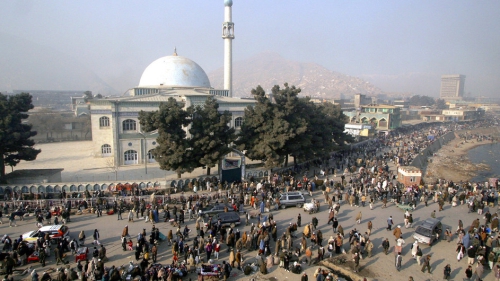Wadih El Hage: Charging After Justice
The unexpected outburst from accused Osama Bin Laden accomplice, Wadih El Hage, at a pretrial hearing Tuesday in New York, is an indication of the high anxiety level surrounding the U.S. prosecution of several alleged terrorists in connection with last summer's bombings of U.S. embassies in Nairobi, Kenya and Dar Es Salaam, Tanzania. Hage, an American citizen and convert to Islam living in Arlington, Texas, is accused of being Bin Laden's personal secretary and has been indicted on charges of perjury and conspiracy to kill U.S. nationals, according to an FBI declassified executive summary released in November 1998.
Hage reportedly leapt out of his chair and charged U.S. District Judge Leonard Sand before being tackled by bailiffs Tuesday. The defendant, incensed over the judge's refusal to read a letter to the court, later apologized for the outburst and blamed security restrictions and inhumane prison conditions for the lapse in his otherwise peaceful composure. But the evident tension surrounding Hage's trial raises questions concerning Hage's personal character and the legal atmosphere that has developed since 15 individuals were indicted last September in connection with the embassy bombings in August that killed 224 people, including 12 Americans.
An April 19 PBS Frontline expose' on Hage describes Hage's background as follows: Hage is a 38 year-old of Lebanese Christian descent who converted to Islam when he was 14 while in Kuwait with his family. Facing ostracism from his father for his religious convictions, he came under the protection of a prominent Kuwaiti Shaykh who funded his university education in Louisiana. Hage spent time in Afghanistan during the Soviet occupation teaching and distributing religious and educational materials. He was granted U.S. citizenship in 1989 after marrying an American Muslim woman from Arizona. With the exception of brief stays in Sudan and Kenya, Hage has lived quietly in Texas as the father of seven children and the employee of a tire company.
Reacting to the news of his indictment and high-security imprisonment without bail, the Muslim community in Arlington, his family and several acquaintances expressed their surprise at the charges. He has been described by close associates as a "quiet, family man" and "not a criminal ... not a terrorist," according to reports by Frontline and the Associated Press (AP). According to the AP, Hage's lawyer, Sam Schmidt, stated after Tuesday's incident that he couldn't "even conceive of Hage even thinking of attacking the judge" and that his uncharacteristic behavior could only be explained by extreme frustration at the prison conditions.
According to the FBI report, Hage served as Bin Laden's personal secretary while in Sudan in 1994. U.S. intelligence sources allege that the American then traveled to Kenya to set up Help Africa, an NGO committed to humanitarian aid, as a front for Bin Laden-sponsored clandestine terrorist activity targeting the United States. According to an April Frontline interview with Hage's mother-in-law, who accompanied her daughter and Hage to Sudan, the family left Sudan on the request of Hage's wife, who objected to Bin Laden's suggestions that Hage take a second spouse. According to the interview, all contact with Bin Laden ended when the family moved to Kenya. Hage's mother-in-law is convinced Hage is being prosecuted for his acquaintances rather than any complicity in the bombings. According to the Frontline interview, Hage's mother-in-law feels that, "He's not an extremist ... But he could know people all the way along the spectrum ...That's his problem maybe. He just knows everybody. He just tries to make peace."
While Hage faces lesser charges than many of the suspects, who, including Bin Laden himself are charged with 224 counts of murder, the sole American defendant confronts the same hysteria evidenced in the hasty American investigation and indictment of the other alleged terrorists. Of the six suspects so far apprehended, many have been held without bail on minor charges while some have been held without charge or ability to make outside contacts. Ali Muhammad, a Florida resident accused of providing training to Bin Laden's alleged network of terrorists, has been held secretly for seven months without charge in what a June 4 APBNews.com report calls "a parallel American judicial system that operates in such secrecy that its officials often refuse to confirm that the defendants exist."
Aside from the legal inconsistencies, indictments of the suspects have been based on a theory of a terrorist network that is of questionable validity. The FBI, operating under a special mandate to conduct its overseas investigations, alleges that Bin Laden functions through an elaborate network of cell units in various countries that together comprise "Al Qaeda." Al Qaeda, according the FBI, is an organized web of hierarchical command with orders coming down to some 10,000 followers world-wide from Bin Laden's control center in Afghanistan.
However, a Saudi Arabian physician living in London who heads the Movement for Islamic Reform in Saudi Arabia, Dr. Saad Al-Fagih, told Frontline that the name "Al Qaeda" comes from a designation given to Bin Laden's efforts to record the names of Arab volunteers during the Afghan war against the Soviets. Al-Fagih describes Bin Laden's organization as nameless and highly decentralized, with a small number of core supporters with him in Afghanistan. The supposed network, according to Al-Fagih, is actually a number of largely independent groups who have taken up the call for, among other things, an end to America's military presence in Saudi Arabia and who look up to Bin Laden as a symbol of resistance rather than a direct commander. The alleged terrorist mastermind thus seems to be more of a phenomenon rather than an instigator of extremist activity against American targets. According to Al-Fagih, America will solve nothing by going after a few alleged masterminds, but must "understand the problem as phenomena. And they have to deal with its grass roots," namely, according to Al-Fagih, American military presence in the Muslim Holy Land.
The tension and ambiguity surrounding Hage's trial was well evidenced in the defendant's seemingly uncharacteristic courtroom outburst. And the cloudy nature of the trial's background is surely inseparable from Hage's prospects for receiving a just ruling. But there remain several unanswered questions in terms of the nature of the evidence against him, the net result of all factors in determining Hage's prospects for a fair trial and the broader implications of the U.S. v. Hage case.
Zakariya Wright is a staff writer at iviews.com

















